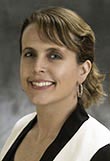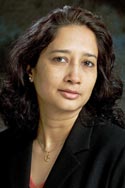Profs’ project shows issues facing refugees
UIndy researchers spent nine months working with local Congolese women

UPDATE: Read NUVO Newsweekly story
Today has been declared World Refugee Day by the United Nations, and two UIndy professors will share their research on local refugees at a downtown event marking the occasion.
Dr. Shannon McMorrow, interim director of UIndy’s Master of Public Health program, and Dr. Jyotika Saksena, graduate director of the International Relations program, have spent the past nine months working with refugee women who fled political and gender-based violence in their home country, the Democratic Republic of the Congo.

In a research technique known as photovoice, the participants were given cameras and asked to take photos of objects and scenes in their lives that relate to their integration into U.S. society and, more specifically, their access to and experiences with health care and other services since arriving. The researchers interviewed the women to develop captions explaining the significance of the photos.
“The idea behind this project was to hear the perspective of refugees by giving them a voice and empowering them to tell their own stories,” Saksena says.
McMorrow and Saksena will share some of the results today at the Indianapolis observance of World Refugee Day, taking place from 11 a.m. to 2 p.m. at the City Market. Organized by Exodus Refugee Inc., the free event will include the photo exhibition, a cooking demonstration, international music and other cultural activities.
The project, Through Their Eyes: Congolese Refugee Women’s Experiences with Integration, Health and Healthcare, was supported by an initial interdisciplinary research grant from UIndy and funding from the Indiana Minority Health Coalition. The researchers collaborated in the work with Exodus, which provides a range of services to international refugees living in Indiana.
UIndy has a longstanding relationship with the organization, and Exodus Executive Director Cole Varga is a graduate of the Master of Arts in International Relations program. More information on the group’s mission is available at exodusrefugee.org.
The stories that emerge from the photos and captions are compelling, touching on issues of housing, transportation, bureaucracy, discrimination, language barriers and access to services.
One photo shows the exterior of a local health clinic. The caption reads, in part: “… yes, there are very good doctors in these beautiful buildings. … But here, the first thing they ask you is appointment; do you have an appointment? …. It’s like appointments is more important than people’s life. You go there at 8 o’clock, they will see you at 5, you will stay there all day. … sometimes you have an appointment and they don’t take you. The waiting in these buildings are too much, are too bad.”
Another shows a pile of clothing and household goods wrapped in garbage bags in preparation for exterminators to spray the participant’s apartment. The caption reads: “This is sad because they find they have cockroaches and other insects in my house so I have to do all this laundry and pack all of them like that, so they can … spray the medication. That picture is of packing; reminds me of war in Africa where you have to pack and keep running, keep on the run.”
McMorrow and Saksena already have begun presenting on the project at national and regional conferences and plan to publish their results and recommendations in several journals relating to health issues and international relations.
